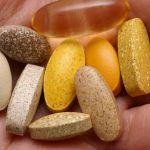
Improving vitamin D levels can correct symptoms of irritable bowel syndrome, say researchers
Monday, February 24, 2020 by Evangelyn Rodriguez
http://www.naturalnewsnutrients.com/2020-02-24-vitamin-d-corrects-irritable-bowel-syndrome.html

Hypovitaminosis D, or vitamin D deficiency, is a common health problem experienced by many, particularly those living in cold countries and those getting limited sun exposure. In the U.S., four out of 10 individuals are likely to have insufficient vitamin D levels. If left unaddressed, vitamin D deficiency can cause a variety of health problems, such as fatigue, weight gain, hair loss and loss of bone density.
Vitamin D deficiency is also common in people with obesity, Type 2 diabetes and depressive symptoms. Meanwhile, irritable bowel syndrome (IBS) is associated with comorbid conditions like anxiety and depression and is common in people with morbid obesity. On account of these associations, researchers from the U.S. decided to investigate the relationship between vitamin D deficiency and medically complicated obesity with bowel symptoms. In their study, which was published in the journal Nutrition Research, they found evidence suggesting that hypovitaminosis D is associated with the bowel symptoms experienced by people suffering from obesity and diabetes.
How vitamin D levels are linked to irritable bowel syndrome
In their previous study, the researchers reported that 30 percent of people with medically complicated obesity have bowel symptoms suggesting irritable bowl syndrome (IBS). However, the prevalence of bowel symptoms is not related to body mass index or diabetes mellitus. On the other hand, antidepressants have been shown to improve global symptoms in people with IBS. Hence, the researchers hypothesized that the high prevalence of bowel symptoms experienced by people with medically complicated obesity is associated with vitamin D deficiency.
To test their hypothesis, the researchers conducted a single-institution, retrospective cohort study in a large, urban community teaching hospital. They asked people considering bariatric surgery to complete a Manning symptom questionnaire over the span of two years to quantify bowel symptoms. The Manning Criteria is a widely used diagnostic tool for IBS. The researchers also asked the participants to undergo testing to determine their serum 25-hydroxy vitamin D levels.
Among 271 subjects, 229 completed 25-hydroxy vitamin D testing. Sixty-seven individuals (29 percent) had three to six Manning bowel symptoms, suggesting IBS. Eighty-four subjects (37 percent) had Type 2 diabetes while 180 (79 percent) had vitamin D insufficiency. The researchers found significantly negative associations between Manning bowel symptoms and vitamin D concentrations in obese subjects, as well as in obese and diabetic subjects.
Based on these findings, the researchers concluded that the high prevalence of bowel symptoms in people with medically complicated obesity is associated with hypovitaminosis D.
Why you need vitamin D
Vitamin D is considered an essential vitamin that can be obtained from foods or via sun exposure. Ultraviolet radiation from the sun can trigger the production of vitamin D in the skin, which is why sunlight is considered the best source of vitamin D.
Despite its name, however, vitamin D is not really a vitamin, but rather a hormone. The skin naturally contains the precursor of vitamin D called 7-dehydrocholesterol. Exposure to ultraviolet rays triggers the conversion of this precursor into cholecalciferol, a type of vitamin D more commonly known as vitamin D3.
Your body needs vitamin D for a variety of reasons. This fat-soluble vitamin:
- Helps keep bones and teeth healthy
- Supports brain health
- Helps maintain a healthy immune system and nervous system
- Regulates insulin levels
- Supports heart and lung health
- Influences the expression of cancer-related genes
- Supports a healthy pregnancy
Vitamin D is important for maintaining great overall health. To avoid hypovitaminosis D, eat plenty of vitamin D-rich foods like fatty fish, egg yolks, cheese and mushrooms. You can also spend at least 10 to 15 minutes in the sun every day to help your skin produce sufficient amounts of vitamin D. (Related: Vitamin D: How to Determine Your Optimal Dose.)
Sources include:
RECENT ARTICLES


Can CoQ10 reduce the appearance of wrinkles?
By Ralph Flores

Nutrients and brain health: Which ones are great for improving mental health?

A bit of healthy fat in your green smoothie goes a long way: Why you need fat-soluble vitamins in a balanced diet
By Zoey Sky

Ahiflower oil provides a balanced ratio of omega-3, omega-6, and omega-9 fatty acids to maintain optimal health
COPYRIGHT © 2017 NATURAL NEWS NUTRIENTS

